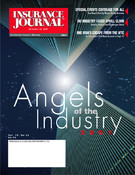The ramifications of the Sept. 11 terrorist attacks on the insurance industry are becoming more and more apparent. While the attacks are portrayed as the worst ever on U.S. soil, the repercussions continue to affect numerous other countries.
As the Bush Administration and the U.S. Congress hash out a plan to assist American insurers in dealing with unprecedented losses and costlier reinsurance premiums, the single biggest payer looks to be Münchener Rückversicherungsgesellschaft (Munich Re), the world’s largest reinsurer.
To point out the irony of a German company paying the most claims for an American tragedy would seem arbitrary, given the scope of Munich Re’s international holdings and the international stature of New York City; besides, the media has been quick to report the global implications of the attacks. It should further come as no surprise that the world’s largest reinsurer would face the most exposure. The steps Munich Re takes to protect itself from any future large-scale terrorist or political claims, however, could be of considerable significance to the rest of the industry.
The exact amount of Munich Re’s total bill will take some time to calculate. Indeed, as of Sept. 20, the company had yet to receive a single claim from any affected insurer.
But Dr. Hans-Jürgen Schinzler, chairman of the company’s management board, offered a “conservative” estimated pre-tax loss of more than $1.8 billion, which would equate to the largest loss in Munich Re’s history. In relation to premium income, however, the loss would be less than that which it faced following the 1906 San Francisco earthquake.
Dr. Schinzler noted further, “In view of the complexity of the loss occurrence, it could take a long time to settle claims. We will of course stand by our business partners from the outset and offer them every support.”
Munich Re’s biggest U.S. subsidiary, Princeton, N.J.-based American Re Corp., has already reported a loss of more than $500 million for the third quarter of 2001, with more than half of this amount due to the Sept. 11 attacks. On top of that, the more recent plane crash in Queens on Nov. 12 will cost Munich Re another $50 million. Schinzler elaborated on the potential effects these events would have on the industry: “The plane crash in New York on 12th November is further proof of the pressing need to fundamentally rethink and reassess the risk situation as a whole, and not only in aviation insurance.”
The company plans to provide American Re with a capital injection of more than $1 billion in order to take advantage of the U.S. market turn; to that end, Munich Re will also provide another $80 million to its smaller Atlanta-based life reinsurance subsidiary Munich American Reassurance Co.
An initial analysis on Munich Re’s website lays out the company’s vision for how the industry should realign itself, offering terms by which insurers and reinsurers can more effectively assess political risks.
The company states: “It is clear from the dramatic events of 11th September 2001 that the private insurance industry must completely and unconditionally rethink its policy on covering political risks and follow through with the requisite decisions.” These include:
• A clear definition of uninsured and uninsurable political risks, adjusted to current circumstances and excluded from general insurance coverage
• A clear distinction between insured risks anduninsured risks
• Reversal of the onus of proof in favor of the insurer
• Provisions enabling cancellation of political risk coverage with short notice
• Agreement upon annual limits of indemnity and appropriate deductibles
• State compensation that precedes indemnification by insurers should be offset against that indemnification
• Additional charges should apply for extended coverage of political risks.
Besides these terms, which Munich Re believes will control liabilities, the company suggests that reinsurers offer non-proportional reinsurance coverage on a per-event basis and proportional treaties with occurrence limits.
Because Munich Re’s role in the reinsurance industry is so considerable—it provides coverage for more than 5,000 insurance clients in 150 countries—whatever actions it takes to safeguard against future terrorist-related claims will likely affect the way other insurers and reinsurers underwrite such risks.
According to its website, the company believes that insurance and reinsurance will have to be “completely rethought.” It looks as though the world’s Über-reinsurer is already headed in that direction.
Topics USA Reinsurance
Was this article valuable?
Here are more articles you may enjoy.


 ‘Structural Shift’ Occurring in California Surplus Lines
‘Structural Shift’ Occurring in California Surplus Lines  Insurance Broker Stocks Sink as AI App Sparks Disruption Fears
Insurance Broker Stocks Sink as AI App Sparks Disruption Fears  What Analysts Are Saying About the 2026 P/C Insurance Market
What Analysts Are Saying About the 2026 P/C Insurance Market  The $10 Trillion Fight: Modeling a US-China War Over Taiwan
The $10 Trillion Fight: Modeling a US-China War Over Taiwan 


